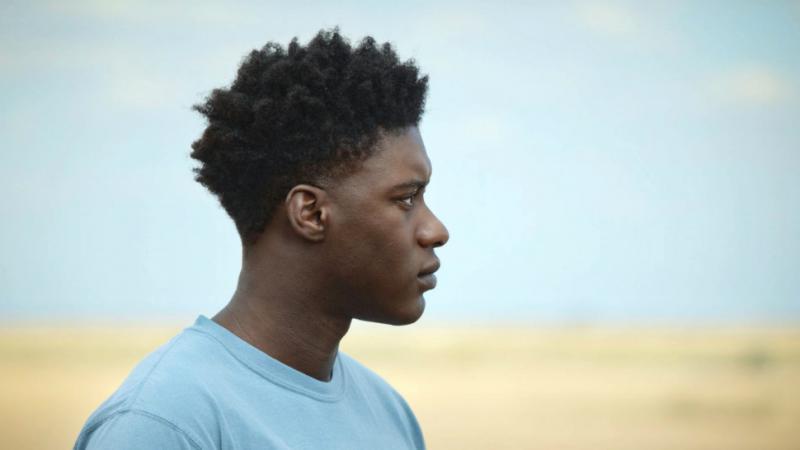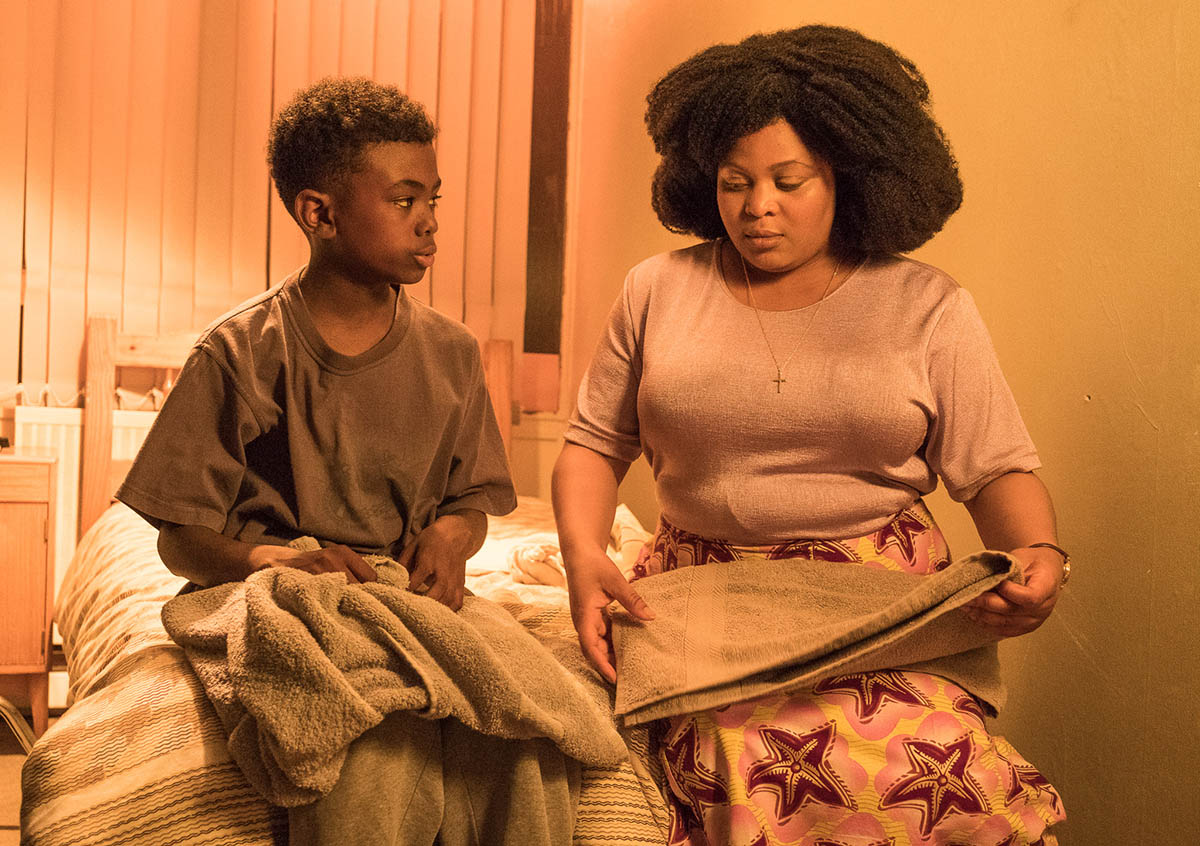The Last Tree review - young, angry, and black in '90s UK | reviews, news & interviews
The Last Tree review - young, angry, and black in '90s UK
The Last Tree review - young, angry, and black in '90s UK
Superb acting enriches Shola Amoo's story of a British-Nigerian boy exiled in London

Putting a radical spin on a fish-out-of-water story, The Last Tree explores troubling aspects of the African diaspora experience in an England riddled with xenophobia and black-on-black racism.
The film begins with a sunlit idyll in the Lincolnshire countryside. An 11-year-old British Nigerian, Femi (Tai Golding) runs around outdoors and gets “all over mud” with his three schoolmates – but for the colour of his skin they could be Richmal Crompton’s William Brown and his Outlaws reborn.
Without warning, Femi is plucked from this rural paradise, his loving white foster mother Mary (Denise Black), and his friends to live with his strict Yoruban birth mother Yinka (Gbemisola Ikumelo) in her flat on a decaying inner-London estate. Mocked for his overtly African first name on his first day at his new school, he gets into a fight with the boy who insulted him and is threatened with immediate expulsion. By the age of 16, Femi (now broodingly played by Sam Adewunmi) is an angry, weed-smoking troublemaker perplexed by his two black mates’ harassing of his wary school crush Tope (Ruthxjia Bellenea), whose skin is darker than theirs. Resenting Yinka for removing him from Mary and disaffected from his school, despite his academic abilities and the efforts of a concerned teacher who empathises with his plight, Femi self-destructively becomes muscle for a local black gangster and drug dealer, Mace (Demmy Ladipo), who buys his services with the gift of a Mobile phone. Femi seems oblivious to the fact that Mace is exploiting and controlling him, but the viewer is unsurprised when the gangster turns nasty .
By the age of 16, Femi (now broodingly played by Sam Adewunmi) is an angry, weed-smoking troublemaker perplexed by his two black mates’ harassing of his wary school crush Tope (Ruthxjia Bellenea), whose skin is darker than theirs. Resenting Yinka for removing him from Mary and disaffected from his school, despite his academic abilities and the efforts of a concerned teacher who empathises with his plight, Femi self-destructively becomes muscle for a local black gangster and drug dealer, Mace (Demmy Ladipo), who buys his services with the gift of a Mobile phone. Femi seems oblivious to the fact that Mace is exploiting and controlling him, but the viewer is unsurprised when the gangster turns nasty .
What is Femi looking for? Coming of age requires him to make peace with both his mothers, to find his father – the structuring absence of the film’s first and second acts – and to embrace his African-ness. He visits Mary and elicits from her an apology for promising him he could stay with her forever and hears out Yinka when she tells him she thought she was doing her best for him when she fostered him out. Amoo is a little harsh on these well-meaning women, though Femi reconciles with both of them. When he and Yinka, growing closer, travel to Lagos, a revelation about her independent spirit and adherence to the traditional Yoruba religion has enormous emotional and spiritual consequences for Femi.
His transition into a muscly, misguided youth, his war with YInka, and his involvement with an older criminal link The Last Tree to Barry Jenkins’s Moonlight. Like the 2016 Best Picture Oscar-winner, it disobeys the rules of social realism with its stylistic flourishes – Spike Lee-like closeups of Femi when he’s stoned, red-lit evocations of urban hellishness – its bursts of majestic orchestral music in the Lincolnshire scenes, and its concentrated subjectivity. A scene in which Femi fantasises kissing Tope after he rescues her from her persecutors throbs truthfully of teen yearning. The Lagos sequence, which captures Adewunmi himself interacting with Nigerians, is rewardingly spontaneous.
The Last Tree is an advance on Amoo’s gentrification film A Moving Image (2016) and announces him as an important British director – one whose work demands a multicultural audience. It can’t be over-stressed how much he owes to his actors, especially Adewunmi (potentially a major discovery), Golding, Ikumelo, and Bellenea. The suspicion in Bellenea’s eyes speaks volumes.
rating
Share this article
The future of Arts Journalism
You can stop theartsdesk.com closing!
We urgently need financing to survive. Our fundraising drive has thus far raised £49,000 but we need to reach £100,000 or we will be forced to close. Please contribute here: https://gofund.me/c3f6033d
And if you can forward this information to anyone who might assist, we’d be grateful.

Subscribe to theartsdesk.com
Thank you for continuing to read our work on theartsdesk.com. For unlimited access to every article in its entirety, including our archive of more than 15,000 pieces, we're asking for £5 per month or £40 per year. We feel it's a very good deal, and hope you do too.
To take a subscription now simply click here.
And if you're looking for that extra gift for a friend or family member, why not treat them to a theartsdesk.com gift subscription?
more Film
 After the Hunt review - muddled #MeToo provocation
Julia Roberts excels despite misfiring drama
After the Hunt review - muddled #MeToo provocation
Julia Roberts excels despite misfiring drama
 London Film Festival 2025 - Bradley Cooper channels John Bishop, the Boss goes to Nebraska, and a French pandemic
... not to mention Kristen Stewart's directing debut and a punchy prison drama
London Film Festival 2025 - Bradley Cooper channels John Bishop, the Boss goes to Nebraska, and a French pandemic
... not to mention Kristen Stewart's directing debut and a punchy prison drama
 Ballad of a Small Player review - Colin Farrell's all in as a gambler down on his luck
Conclave director Edward Berger swaps the Vatican for Asia's sin city
Ballad of a Small Player review - Colin Farrell's all in as a gambler down on his luck
Conclave director Edward Berger swaps the Vatican for Asia's sin city
 London Film Festival - from paranoia in Brazil and Iran, to light relief in New York and Tuscany
'Jay Kelly' disappoints, 'It Was Just an Accident' doesn't
London Film Festival - from paranoia in Brazil and Iran, to light relief in New York and Tuscany
'Jay Kelly' disappoints, 'It Was Just an Accident' doesn't
 Iron Ladies review - working-class heroines of the Miners' Strike
Documentary salutes the staunch women who fought Thatcher's pit closures
Iron Ladies review - working-class heroines of the Miners' Strike
Documentary salutes the staunch women who fought Thatcher's pit closures
 Blu-ray: The Man in the White Suit
Ealing Studios' prescient black comedy, as sharp as ever
Blu-ray: The Man in the White Suit
Ealing Studios' prescient black comedy, as sharp as ever
 The Woman in Cabin 10 review - Scandi noir meets Agatha Christie on a superyacht
Reason goes overboard on a seagoing mystery thriller
The Woman in Cabin 10 review - Scandi noir meets Agatha Christie on a superyacht
Reason goes overboard on a seagoing mystery thriller
 London Film Festival 2025 - crime, punishment, pop stars and shrinks
Daniel Craig investigates, Jodie Foster speaks French and Colin Farrell has a gambling habit
London Film Festival 2025 - crime, punishment, pop stars and shrinks
Daniel Craig investigates, Jodie Foster speaks French and Colin Farrell has a gambling habit
 I Swear review - taking stock of Tourette's
A sharp and moving tale of cuss-words and tics
I Swear review - taking stock of Tourette's
A sharp and moving tale of cuss-words and tics
 A House of Dynamite review - the final countdown
Kathryn Bigelow's cautionary tale sets the nuclear clock ticking again
A House of Dynamite review - the final countdown
Kathryn Bigelow's cautionary tale sets the nuclear clock ticking again
 theartsdesk Q&A: Idris Elba on playing a US President faced with a missile crisis in 'A House of Dynamite'
The star talks about Presidential decision-making when millions of lives are imperilled
theartsdesk Q&A: Idris Elba on playing a US President faced with a missile crisis in 'A House of Dynamite'
The star talks about Presidential decision-making when millions of lives are imperilled

Add comment